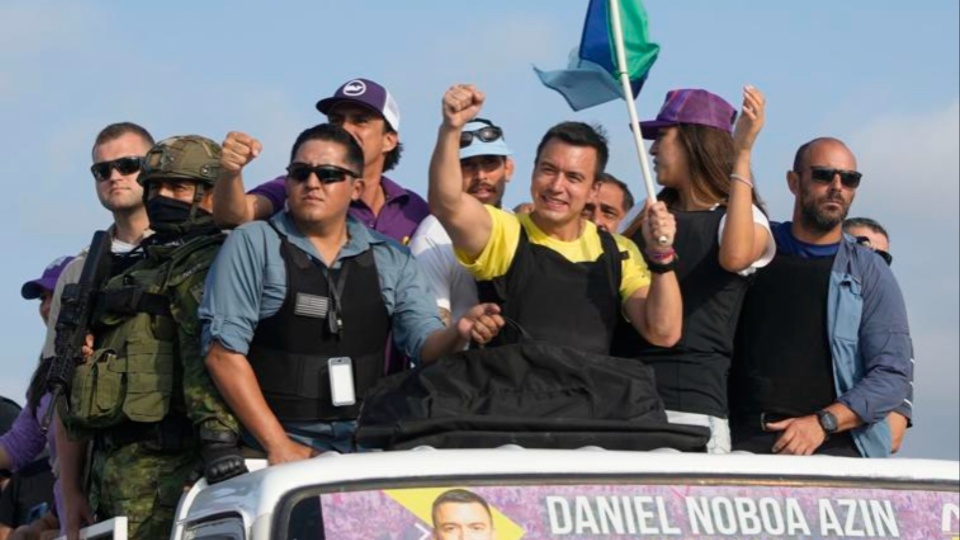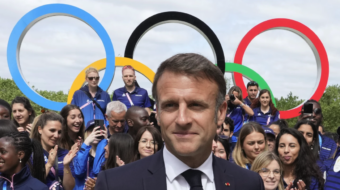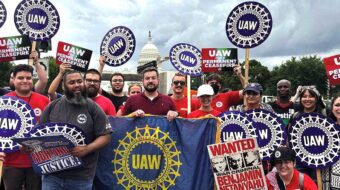
Second-round presidential voting took place in Ecuador on Oct. 15. With 90% of the votes counted, the winner was 35-year-old Daniel Noboa of the National Democratic Action alliance, heir of a vast business fortune. He gained 52% of the votes, while his opponent, lawyer Luisa González, representing the progressive Citizen’s Revolution party took 48%.
González had defeated Noboa in the first round of voting on Aug. 20 with her 33.6% to his 23.4%. By then, eight political leaders had been assassinated, including a mayor, two municipal councilors, a legislative candidate, and presidential candidate. Campaigning for the second round, the candidates wore body armor, traveled in bulletproof vehicles, and were surrounded by large security detachments.
Noboa will be completing the presidential term of banker Guillermo Lasso who, elected in 2021, was facing impeachment on corruption charges as of May 2023. Lasso arranged for his own departure. By dissolving the National Assembly, he triggered a constitutionally required presidential election. Noboa will be serving only 17 months, with the regular election cycle resuming in 2025.
Candidate González offered plans for economic justice, “dignified work,” protecting women and labor rights, but also crime prevention and “citizen security.” She emphasized support for the legacy of the Rafael Correa government (2007-17) which expanded access to healthcare and education, fought poverty, and strengthened the national economy.
Noboa’s campaign featured lavish spending on publicity and campaign events, and on gifts and favors for his followers.
His election compounds difficulties for working, Indigenous, and marginalized Ecuadorans. One analysis sees him as continuing an “Ecuadorian capitalism based on state resources, tax evasion, and super-exploitation of workers,” which, after Correa’s ten-year-long government, “consolidated into an agro-exporter-commercial-banking kind of capitalism.” Presidents Moreno and Lasso were the consolidators, from 2017 on.
For Ecuadorian sociologist Irene León, the elections centered on the “geo-economy,” which is about “priorities set by foreign capital and big corporations and implemented by local capitalists seeking to position themselves in the stateless dynamic of the world market.”
Emblematic of President-elect Daniel Noboa’s ties to U.S. business and politics are his degrees from the Stern School of Business at NYU, Harvard’s Kennedy School of Government, and from George Washington University.
León refers to “actors involved in the business of destruction and reconstruction, [who] sell scenarios of chaos and models of security, along with arms, intelligence, and mercenaries.” She laments that previously Ecuador was one of the safest countries in the region and now is one of the most violent.
The election of Noboa suited U.S. government purposes for Ecuador. Proponents of social and economic reform gained little traction, and Ecuador shows every sign of remaining open to investments, extraction, and export of natural resources, and U.S. overview generally. The way had been prepared.
President Lasso in 2021 signed one decree that deregulated operational processes in oil and gas extraction and another that sought to increase mining exports. Under Presidents Moreno and Lasso, “Ecuador-China ties weaken[ed] in the fields of technology, lending, and investment.” And as “Ecuador has grown more skeptical of China, the United States has stepped in to court the Andean country,” according to the Global Americans think tank.
As pointed out by that apologist for the two countries’ “deeper engagement,” “Ecuador is estimated to hold a prodigious source of extractable reserves including antimony, copper, iron ore, silver, and world-class gold deposits.”
Now the U.S. government is fashioning a new hold on Ecuador. It will be providing security, mostly by way of collaboration against narco-trafficking. The effect will be to defend the status quo there.
Uruguayan Journalist Aram Aharonian recently outlined Ecuador’s new role in Latin America as a major transit point for illegal drugs on their way to North America. He notes that the “total production worldwide” of materials for producing cocaine is “concentrated” in Latin America, which is a major source, too, of marijuana and opioids.
There are two major routes. One flows from cities and ports in Brazil, Paraguay, Argentina, and Uruguay to Europe. The other, the “Amazonian route,” has illicit drugs leaving from Peru and Colombia to Pacific port cities, primarily in Ecuador, and from there to Central America and on to the United States.
Ecuador’s Pacific coast is “under the control of criminal narco-trafficking gangs.” Ecuador uses the U.S. dollar as its national currency underlies the big business there of laundering drug money.
Ecuador since 2019 has become one of the most violent countries in the world. There were fewer than 1,000 murders per year before then; 2,500 violent deaths in 2022; and 4,200 murders so far this year.
As a journalist and a politician, presidential candidate Fernando Villavicencio had denounced the gangs and corruption. He was assassinated on Aug. 9. The BBC reported that on Oct. 7, seven Colombian men accused of killing Villavicencio were found murdered in Ecuadorian prisons.
With Noboa’s ascendancy to the presidency, U.S. military intervention has a new lease on life in Ecuador. That’s a far cry from 2009 when the Ecuadorian government of President Correa forced the U.S. military to abandon its large base near the coastal city of Manta.
General Laura Richardson, Commander of the U.S. Southern Command, was present in Sept. 2022 as the U.S. government delivered $730,000 worth of military equipment to an Ecuadorian Army brigade. State Department representatives 11 months later “delivered $3.1 million of support” to units of the Ecuadorian Armed Forces.
The Department’s press release mentioned “maritime interdiction operations along the northern border and associated Amazonian waterways” and “fight against drug trafficking, organized crime, human trafficking, illegal mining, and other threats.”
On Sept. 27, the Biden administration took the occasion of President Lasso’s visit to Washington to sign an agreement that permits U.S. troops to be deployed in Ecuador, primarily on land and at sea along Ecuador’s coast, which is seen as an area “much affected by drug cartels operating in the region.”
Broadcasting the special U.S. relationship with Ecuador is the United States-Ecuador Partnership Act of 2022. Part of the National Defense Authorization Act that became law on Dec. 23, 2022, the Partnership Act “includes measures for strengthening democratic governance in Ecuador and increasing security cooperation and economic and commercial ties between the two countries.” The now disgraced Sen. Bob Menendez had proposed the law.
For the U.S. government, the precedent would be U.S. Plan Colombia, which, initiated in 2000, provided for U.S. military intervention ostensibly against drug trafficking. The effect has been to establish Colombia as a U.S. beachhead in a region full of wealth, but also of tensions and possibilities of popular uprisings.
A great unknown for those in charge in Ecuador now is the prospect of a political uprising of Indigenous people in the style of, in varying degrees, Bolivia, Peru, and Chile. Protection from the U.S. government represents a crude sort of insurance protection.
We hope you appreciated this article. At People’s World, we believe news and information should be free and accessible to all, but we need your help. Our journalism is free of corporate influence and paywalls because we are totally reader-supported. Only you, our readers and supporters, make this possible. If you enjoy reading People’s World and the stories we bring you, please support our work by donating or becoming a monthly sustainer today. Thank you!












Comments